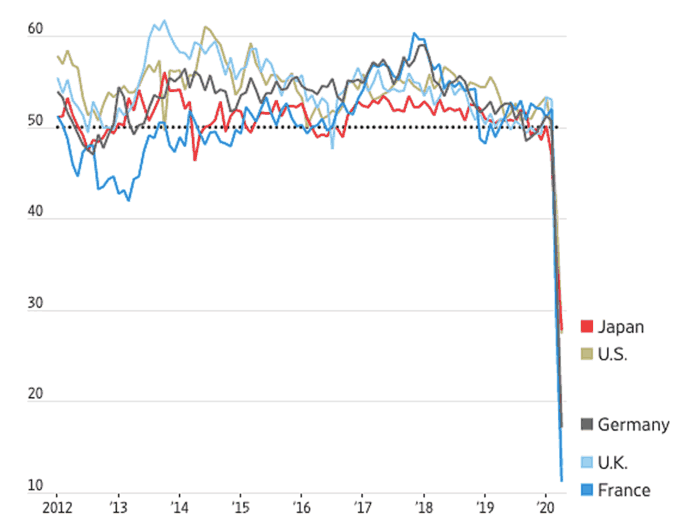April – the time of the countries blockade, social isolation recorded a record low production and service index.
The monthly Purchasing Managers’ Index (PMI) is done by surveying leaders of private companies in the manufacturing and service industries, contributing to the overall health assessment of the whole economy. PMI is used by business people to understand market trends are expanding, standing still or shrinking.
April PMI showed that business activities in the US, Europe and Japan plunged as governments tightened travel and social interaction to limit the spread of Covid-19. A survey released by IHS Markit yesterday (23/4) shows that social isolation measures have clearly affected the economic components that operate in direct contact between people – like restaurants or Barber shop – is inevitable.
In general, service sector activity fell sharply in unprecedented survey history, larger than during the financial crisis. Production activities are not as serious.
According to IHS Markit, the April PMI of the US was only 27.4 points, a sharp decrease compared to 40.9 in March. PMI below 50 showed that the business activities were in decline.
This is also the lowest level of the US since October 2009. “The decline of PMI is the latest signal that the second quarter of 2020 will be a quarter of economic recession,” said Chris Williamson, chief economist at IHS Markit.

In the eurozone, this month’s PMI is only 13.5 points, down from 29.7 in March 2020. This is also a record low since July 1998. “April saw unprecedented damage to the euro zone due to blockade measures, declining world demand, labor and input shortages,” Williamson said.
In France, the service PMI in April was 10.4 points, down from 27.4 points last month. This shows that most of the service enterprises’ operations have been halted.
Other surveys also show similar freezing in the eurozone’s second largest economy. The French national statistics agency said companies had the biggest month of losing business confidence since 1980. French factories are operating at 67% of capacity, the lowest level since 1976.
In the UK, PMI April dropped to a record low of 12.9 from 36 points in March. Germany is slightly better, with PMI to 17.1 points, from 35 last month. However, the PMI spread across Europe is relatively small. The survey also shows that, although pandemics occur in different countries at different times, the overall result is the unprecedented stagnation of economic activity.

With a larger decline than expected, it is likely that the global economy in the second quarter of 2020 will be more difficult than the previous forecasts. “We know that the blockade and closure of most of the economy will make the PMI plummet from the previous month. But the actual decline still stunned us,” said Rosie Colthorpe, an economist at Oxford Economics. consider.
Governments across Europe concluded that a sharp drop in economic output was inevitable when taking measures to prevent Covid-19. What they are concerned about is that shutdowns can cause long-term economic losses. Therefore, countries have launched a series of programs to support businesses and households to minimize risks.
One of the measures used is that the government pays workers of businesses that lose revenue. Surveys published on April 23 indicated that, although there were signs that those programs were limiting layoffs, the number of people losing jobs in April 2020 in Europe was the highest on the calendar. statistical history.
Economists believe that tragic economic figures in April 2020, including PMI, will cause countries to gradually lift restrictions. Currently, Germany has done this and other countries in Europe are expected to follow suit next month.
“Things can’t go down forever. Once the companies are completely shut down, the worst output is nothing to get worse next month,” said Simon Wells, an economist at HSBC. He said that the quarantine eased in the near future will help economic activities gradually recover.
However, the social gap is likely to continue for months to come, in line with the government’s regulations or people’s own mentality. That means the business is unlikely to recover as quickly as the rate at which it decreases.
A big problem with Europe is that different countries are able to reopen their activities at different speeds, and with the supply chain has changed. This may hinder the pace of recovery, as some businesses will not have enough inputs even if they are allowed to produce again.
“The lack of coordination among countries, and some countries rushing to reopen their economy before others, will hinder the effectiveness of recovery, due to the coherence of Eurozone regional value chains,” Barclays economic analyst.
Surveys show that the global economy has almost entered a recession, with first-quarter figures showing a sharp decline in economic output. JP Morgan forecasts that eurozone GDP will decrease by 45% in the 3 months to June. UK GDP is expected to fall by 59.3% and Japan will decrease by 35% over the same period.
Korea’s first quarter GDP fell 1.4% from the end of last year – the worst since the end of 2008. The US and Europe will release estimates for the first quarter next week. The reduction in the first quarter is expected to be very large, but may still be lower than the second quarter.
Source vnExpress-24/04/2020

 Tiếng Việt
Tiếng Việt
